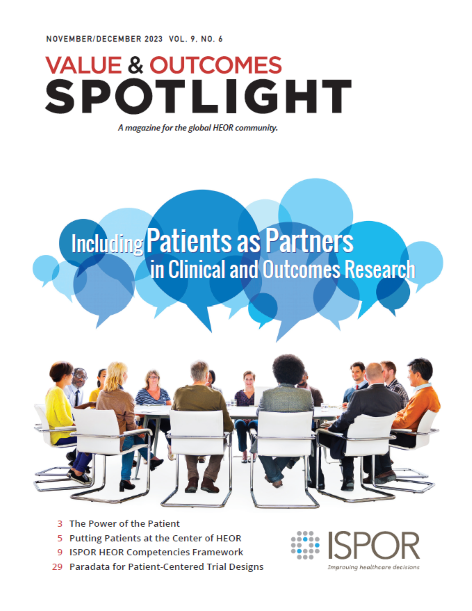The Power of the Patient

Patient centricity and patient engagement in clinical and health economics and outcomes research (HEOR) is a key component of value-based healthcare, which focuses on improving the quality of care, while reducing costs. In the past, patients were passive recipients of healthcare; today they are active participants. With a multitude of available resources, patients and caregivers have become more educated about, more engaged in, and more empowered in their choices over their own healthcare and treatment. Patients want to partner, engage, and work with their healthcare providers to have access to the best treatments and maximize outcomes to improve their lives in ways that are more meaningful to them.
Patient voices matter. We should not underestimate the power of the patient. Through meaningful partnerships with patients, patient advocacy groups, patient influencers, and caregivers, we can gain significant patient insights and knowledge to build a foundation from clinical trial design to lifecycle management and execution of innovative treatments. These partnerships could also guide future research and development and provide clinical and real-world evidence to inform decisions of healthcare leaders, researchers, manufacturers, payers, and policy makers. By demonstrating patient value, we will be able to provide a holistic approach and personalized patient solutions to improve patient outcomes.
To achieve patient centricity, we must listen to patients, understand their patient journeys and their experiences, have continuous dialogue with them and their caregivers to really understand what they face and find solutions that matter most to them. This involves incorporation of patient perspectives across the full care spectrum, including clinical and outcomes research, lifecycle of the drug development process, shared healthcare decision making, patient outcomes measures, and how value is defined through their lens.
Best practices in conducting patient-centric research include engaging patients in the research process, collecting data on the patient’s experience, and using patient-centered outcomes. Collecting data on the patient’s experience can help to identify areas where improvements can be made. This could include things like dietary changes, exercise programs, or mental health support. By addressing these issues, healthcare providers can improve patient outcomes and help patients to live healthier lives.
Patient-centered clinical trials and outcomes research are critical to improving healthcare. These trials focus on the patient experience and aim to improve patient outcomes by taking into account the patient's perspective. These are designed to be more inclusive to better reflect the diversity of patients, be more flexible by allowing for changes to be made based on patient feedback, and they can help to improve patient engagement. By involving patients in the design and implementation of clinical trials throughout the lifecycle of the drug development process, healthcare providers and researchers can ensure that the trials are more relevant to the patient's experience. This can help to improve patient outcomes, increase patient satisfaction with the healthcare system, and improve adherence and persistence. When patients are engaged and invest in their own health, we see better patient outcomes.
Patient centricity in HEOR can be facilitated by the collaboration of patients, payers, manufacturers, health technology assessment (HTA) agencies, and HEOR professionals. Patients can provide valuable insights into their experiences with healthcare, which can help to inform the development of patient-centered outcomes. Payers can help to ensure that healthcare is accessible and affordable for patients. Manufacturers can develop products that are tailored to the needs of patients. HTA agencies can use real-world evidence to make more informed decisions about patient care. HEOR professionals can help to identify areas where improvements can be made to patient outcomes. By working together, we can help to improve patient outcomes and promote patient-centric healthcare.
As always, I welcome input from our readers. Please feel free to email me at zeba.m.khan@hotmail.com.

